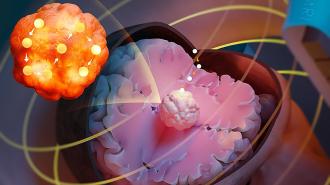University College London (UCL) researchers have demonstrated a new kind of cancer therapy that uses a magnetic “seed” to precisely target and kill brain tumor cells.
The challenge: Glioblastoma is the most aggressive form of brain cancer. It’s almost always fatal, and only 5% of patients live more than five years after diagnosis — about 75% die within a year.
“The treatment is delivered with precision and without having to perform open surgery.”
Rebecca Baker
Typically, the first step in treating glioblastoma is open brain surgery to remove as much of the tumor as possible. Patients then may undergo chemotherapy or radiation therapy to kill cancer cells missed during the surgery.
The recovery time for the surgery alone can range from weeks to months, and the follow-up therapies can have side effects that negatively impact a patient’s remaining quality of life.
The idea: The UCL researchers have now demonstrated a new kind of cancer therapy in mice, which could potentially negate the need for open surgery and lead to a more precise removal of glioblastoma tumors.
They call it “minimally invasive image-guided ablation (MINIMA),” and it starts with implanting a 2 millimeter-wide sphere of metal alloy into the brain.
“This could reduce recovery times and minimize the chance of side effects.”
Rebecca Baker
Because this “seed” is magnetic, a tailored MRI scanner can be used to slowly guide it through the brain. Once the seed reaches the site of a tumor, it can be remotely heated to gradually kill off nearby cancer cells, hopefully destroying the tumor.
“Using an MRI scanner to deliver a therapy in this way allows the therapeutic seed and the tumor to be imaged throughout the procedure, ensuring the treatment is delivered with precision and without having to perform open surgery,” lead author Rebecca Baker said.
“This could be beneficial to patients by reducing recovery times and minimizing the chance of side effects,” she continued.
Looking ahead: The mouse study demonstrates that the new cancer therapy is viable, but more research is needed before it’s tested in people.
If MINIMA does prove to be a safe and effective cancer therapy, the researchers believe it could be used for other cancers besides hard-to-reach brain tumors — it could also help treat prostate cancer, which affects one in eight men.
“While treatments such as radiotherapy and surgery can be effective, they often cause unwanted and debilitating side effects, such as incontinence and impotence,” the study’s lead cancer clinician Mark Emberton said.
“MINIMA may allow us to precisely target and destroy prostate tumor tissue, reducing harm to normal cells,” he continued.
We’d love to hear from you! If you have a comment about this article or if you have a tip for a future Freethink story, please email us at [email protected].






